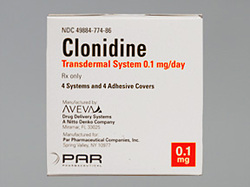Pharmacology definition - Clonidine

Clonidine
Clonidine is useful in treating hypertension. Clonidine is part of alpha 2 agonist which acts on the vasomotor centre of the medulla on the alpha 2 receptors. Binding and activation of the alpha 2 receptors may lead to the release of noradrenaline/ norepinephrine which will lead to decrease in cardiac output and decrease in the vasoconstriction due to decrease in the activity of the central adrenergic system.
Clonidine is also useful in hypertensive patient with renal insufficiency due to clonidine inability to decrease the renal blood flow.
The common side effects of clonidine may include sedation and rebound hypertension in case of clonidine is withdrawn abruptly.
Clonidine is useful in treating hypertension. Clonidine is part of alpha 2 agonist which acts on the vasomotor centre of the medulla on the alpha 2 receptors. Binding and activation of the alpha 2 receptors may lead to the release of noradrenaline/ norepinephrine which will lead to decrease in cardiac output and decrease in the vasoconstriction due to decrease in the activity of the central adrenergic system.
Clonidine is also useful in hypertensive patient with renal insufficiency due to clonidine inability to decrease the renal blood flow.
The common side effects of clonidine may include sedation and rebound hypertension in case of clonidine is withdrawn abruptly.
